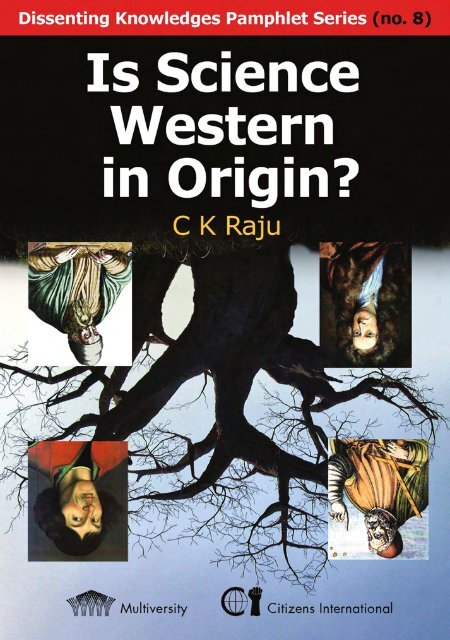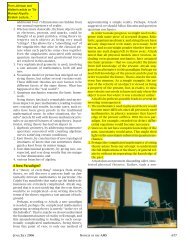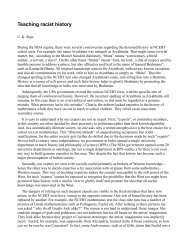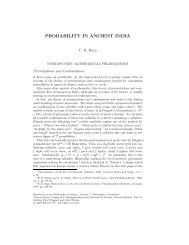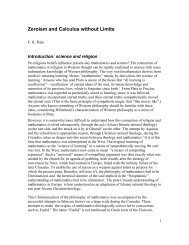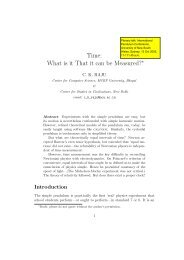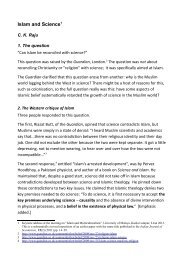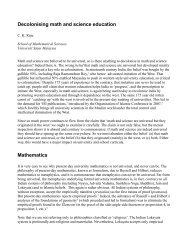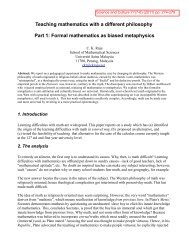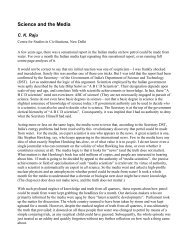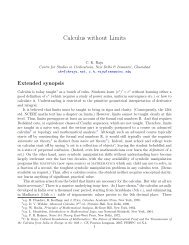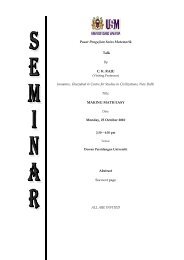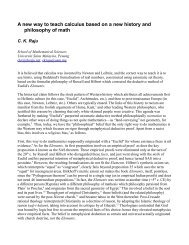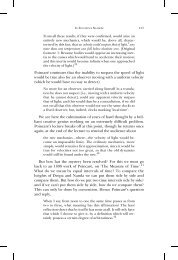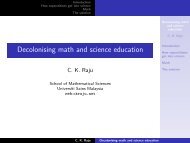Is Science Western in Origin Preview - CK Raju
Is Science Western in Origin Preview - CK Raju
Is Science Western in Origin Preview - CK Raju
Create successful ePaper yourself
Turn your PDF publications into a flip-book with our unique Google optimized e-Paper software.
<strong>Preview</strong> page 2 of 16…Foreword to theDissent<strong>in</strong>g Knowledges Pamphlet SeriesV<strong>in</strong>ay Lal, Found<strong>in</strong>g EditorIn his densely argued essay, <strong>Raju</strong> makes m<strong>in</strong>cemeat of thereceived view of the Greek orig<strong>in</strong>s of science. He speaks ofthree different phases through which the received narrativewas constructed, though his argument is peppered with agreat many other critical observations. The story of theGreek orig<strong>in</strong>s of science, <strong>Raju</strong> argues, can nowhere be found‘from the beg<strong>in</strong>n<strong>in</strong>g of the Christian Dark Age to thebeg<strong>in</strong>n<strong>in</strong>g of the Crusades’. The Greeks had a primitivesystem of numeration; similarly, s<strong>in</strong>ce much has been madeof the great library of Alexandria, it is imperative torecognize that people other than Greeks produced its books.<strong>Raju</strong> has elsewhere, <strong>in</strong> a forthcom<strong>in</strong>g work on Euclid,detailed what exactly it is that we know about Euclid, andwhat might be the sources of our knowledge about Euclid;and he surprises us with the observation that the sum totalof any credible knowledge about someone called ‘Euclid’ iszero. This is the same ‘Euclid’ who had become such aglobalized and universal figure that even someone likeMohandas Gandhi could effortlessly allude to him <strong>in</strong> hisown quest for truth and precision: as he was to expla<strong>in</strong> to thepassengers on board a ship on 25 December 1931, ‘It is a selfevidentaxiom, like the axioms of Euclid, that one cannothave peace unless there is <strong>in</strong> one an <strong>in</strong>tense long<strong>in</strong>g forpeace all round.’ Speak<strong>in</strong>g of zero, however, it is well known
<strong>Preview</strong> page 3 of 16that the idea of zero (sunya) came to the West from India,mediated by the Arabs; but astronomy and trigonometryalso traveled <strong>in</strong> that direction, even if the West has longpersisted <strong>in</strong> the fiction that these sciences were transmittedto India from the West.Hav<strong>in</strong>g established that the story of the transmission ofastronomy and geometry from the Greeks to, <strong>in</strong> effect, therest of the world dur<strong>in</strong>g the Crusades cannot be given anycredence, <strong>Raju</strong> argues that, <strong>in</strong> the period of the Inquisition, aconcerted attempt was made to suggest that Europeans<strong>in</strong>dependently rediscovered the scientific knowledge. <strong>Raju</strong>sees <strong>in</strong> the much-celebrated account of the supposedCopernican revolution, which takes us from a geocentricview of the universe to a heliocentric view, evidence only ofa susta<strong>in</strong>ed and pernicious hellenocentrism. ThoughCopernicus used <strong>Is</strong>lamic sources to reach his conclusions, hefailed to acknowledge them. In the f<strong>in</strong>al phase of the<strong>Western</strong> appropriation of scientific knowledge, whichcont<strong>in</strong>ues down to the present day, the entire apparatus ofimperialist power was marshaled to press forth the case thataccurate scientific knowledge had always been themonopoly of the Europe. Indeed, though <strong>Raju</strong> does not go sofar, this view was bound to prevail <strong>in</strong> Europe consider<strong>in</strong>gthat most ‘natives’ were held to be altogether devoid of thefaculty of reason<strong>in</strong>g. <strong>Raju</strong>’s <strong>in</strong>tent here is also to question thesupposition that knowledge <strong>in</strong> the West has a secular cast.‘Note how theology has crept <strong>in</strong>’, he avers: ‘we are asked tobelieve that science is about deduc<strong>in</strong>g the consequences ofsome “laws” <strong>in</strong>stituted by a god who created the cosmos, ashas been made out <strong>in</strong> the West s<strong>in</strong>ce Newton.’
<strong>Preview</strong> page 4 of 16<strong>Raju</strong>’s pamphlet, then, takes its place along others <strong>in</strong> thisseries that have probed the assumptions underly<strong>in</strong>g thediscipl<strong>in</strong>es of economics and anthropology. This pamphletseries, as I noted at the outset, is one of many enterprises tohave emerged out of the desire of some scholars, academics,activists, and public <strong>in</strong>tellectuals, who first convenedtogether <strong>in</strong> Penang, Malaysia <strong>in</strong> early 2002, to create a newforum, which has been termed “Multiversity”, that will atonce enable a wholesale but rigorous and search<strong>in</strong>g critiqueof the frameworks of modern knowledge as well as moreecumenical political and cultural futures. Multiversity’smembers are committed to the proposition that there needsto be less conversation with the West and more conversationbetween peoples of the South. Long before India, Ch<strong>in</strong>a,Southeast Asia, and Africa <strong>in</strong>teracted with Europe, they<strong>in</strong>teracted with each other; <strong>in</strong>deed, the Indian Ocean was aglobal world, a crossroads, but part of the effect ofcolonialism has been to obscure these earlier histories. Theconception of what constitutes the “world” has narrowed soconsiderably that everywhere outside Europe it meansknowledge only of one’s own country and of the Euro-American world. These, apparently, are the borders of oursupposed cosmopolitanism.…Readers are <strong>in</strong>vited to learn more about the pamphlet seriesand Multiversity by access<strong>in</strong>g http://www.multiworld.organd http://vlal.bol.ucla. edu/multiversity/.University of California, Los AngelesJune 2009
<strong>Preview</strong> page 5 of 16<strong>Is</strong> <strong>Science</strong><strong>Western</strong> <strong>in</strong> Orig<strong>in</strong>?C. K. <strong>Raju</strong>cience is a creation of the West—or so the story goes.On this creation story, science began <strong>in</strong> Hellenic(Greek) culture, and developed <strong>in</strong> post-renaissanceEurope. The rest of the world had no clue.A typical account is <strong>in</strong> the “classic” history of mathematicsby Rouse Ball:The history of mathematics cannot with certa<strong>in</strong>ty be tracedback to any school or period before...the...Greeks...thoughall early races... knew someth<strong>in</strong>g of numeration...and...theelements of land-survey<strong>in</strong>g, yet the rules which theypossessed were...founded only on... observation andexperiment, and were neither deduced from nor did they
<strong>Preview</strong> page 6 of 16form part of any science. 1He presupposes that (a) deduction is more important toscience than observation or experiment (which leads to mere“rules”), and that (b) only the Greek “race” had deduction.Needham avoids the racist part of the explanation; butlapses <strong>in</strong>to an otherwise similar view about Ch<strong>in</strong>ese “landsurvey<strong>in</strong>g”versus Euclidean geometry. 2Unlike political history, it is hard to counter or even expla<strong>in</strong>the biases <strong>in</strong> the history of science. “Information poverty” isa consequence of <strong>in</strong>dustrial capitalism—even otherwiseeducatedpeople are often scientifically illiterate. Like otherilliterates, they uncritically accept and repeat stories fromsocially “authoritative” sources. Scientists, too, may not beknowledgeable enough, for <strong>in</strong> practice they rely heavily onauthority (aga<strong>in</strong> because <strong>in</strong>dustrial capitalism breedsexcessive specialization). Moreover, scientists focus ontechnique, and carelessly propagate any given history.Consequently, very few can put science together with itshistory and philosophy and build a counter-story. India is aparticularly pathetic case: it has no university department ofhistory and philosophy of science, even 60 years after<strong>in</strong>dependence. No wonder, the same old story isperpetuated by current Indian school texts, 3 which mentionmany Greek names as the orig<strong>in</strong>ators of mathematics andscience. These Greek names are accompanied by images ofCaucasian stereotypes. Children get the underly<strong>in</strong>g racistmessage!This history was contested dur<strong>in</strong>g the NDA-led regime, 4 butwith such extreme counter-biases that there was a storm of
<strong>Preview</strong> page 7 of 16protest. Newspapers then highlighted the “saffronization ofhistory”, suggest<strong>in</strong>g that religious fanaticism leads toconcocted history as a means of glorification. Certa<strong>in</strong>ly thisis true, and certa<strong>in</strong>ly this needs to be highlighted. Butdoesn’t this apply to all situations where religion is mixedwith state power? The Crusades and the Inquisition wereperiods of marked religious fanaticism <strong>in</strong> Europe. Did that<strong>in</strong>fluence the <strong>Western</strong> history of science? S<strong>in</strong>gularly enough,the role of religious fanaticism <strong>in</strong> shap<strong>in</strong>g this story seemsnever to have been assessed. Let us do so here.The Crusades and the story ofthe ‘Greek’ orig<strong>in</strong> of scienceThe story of the Greek orig<strong>in</strong> of science postdates theCrusades.Before the Crusades, Christendom was <strong>in</strong> its “Dark Age”. Inthe 4th c., state and church came together <strong>in</strong> the Romanempire. The subsequent book-burn<strong>in</strong>g edicts of RomanChristian emperors, 5 the burn<strong>in</strong>g down of the Great Libraryof Alexandria by a Christian mob, 6 and the closure of allphilosophical schools by Just<strong>in</strong>ian <strong>in</strong> 529 CE, created avacuum of secular knowledge <strong>in</strong> Christendom. Such secularknowledge as existed, prior to the Crusades, was pitiful. Theoutstand<strong>in</strong>g mathematician of the time was Gerbert ofAurillac (Pope Sylvester II), who wrote a learned tome onthe abacus (the k<strong>in</strong>dergarten toy of today). So, it would befair to say that the abacus represented the acme ofmathematical knowledge <strong>in</strong> pre-Crusade Christendom.Ironically, this Christian Dark Age co<strong>in</strong>cided with the
<strong>Preview</strong> page 8 of 16<strong>Is</strong>lamic Golden Age. In sharp contrast to the book-burn<strong>in</strong>gtraditions of Christendom, the Abbasid Caliphate had set upthe Baghdad House of Wisdom by the early 9th c. CE. Thisled to such an explosion <strong>in</strong> the demand for books that, alongthe l<strong>in</strong>es of the hadith to seek knowledge even from Ch<strong>in</strong>a,paper-mak<strong>in</strong>g techniques were imported from Ch<strong>in</strong>a to setup a paper factory <strong>in</strong> Baghdad, which had a flourish<strong>in</strong>g bookbazaar. Libraries proliferated across the <strong>Is</strong>lamic world, andthe 10th c. Umayyad Caliphate <strong>in</strong> Cordoba had a library,catalogued <strong>in</strong> 44 volumes, of over 600,000 tomes. 7Quite naturally, prior to the Crusades, Europeans regardedthe Arabs as knowledgeable. To learn mathematics, Gerbertturned to the <strong>Is</strong>lamic Arabs <strong>in</strong> Cordoba, not to GreekChristian sources <strong>in</strong> Byzantium. (Hence, the numerals heimported are today known as “Arabic numerals”.) So, thestory of the Greek orig<strong>in</strong>s of all science did not exist <strong>in</strong>Europe prior to the Crusades.The Crusades as “barbarian <strong>in</strong>cursions”How did this story emerge dur<strong>in</strong>g the Crusades?…Ever s<strong>in</strong>ce state and church first came together, at the time ofConstant<strong>in</strong>e, Eusebius, a church historian, had <strong>in</strong>itiated theprogram of distort<strong>in</strong>g history to promote church <strong>in</strong>terests.His successor Orosius, <strong>in</strong> his History Aga<strong>in</strong>st the Pagans,made it amply clear that history was just another tool of softpower <strong>in</strong> the church’s armory. This technology of falsehoodwas now applied to “manage” common perceptions. Thestory-l<strong>in</strong>e was simple: it was the Greeks who did it. On this
<strong>Preview</strong> page 9 of 16story, dur<strong>in</strong>g the 600 years of the Christian Dark Age, all thatthe Arabs did was to preserve Greek works, the rightful<strong>in</strong>heritors of which were the chosen people, the Christians ofEurope.It was this fantastic justification—characteriz<strong>in</strong>g Arabs asmere carriers of knowledge, and Greeks as the creative fount—which made the (“Greek”) knowledge <strong>in</strong> Arabic bookstheologically acceptable <strong>in</strong> Europe, and enabled thetranslated Arabic books to be used as university texts forcenturies <strong>in</strong> Europe.Arabs did not quite accept this story. In the 9 th c., when theArabs built the Bayt al Hikma (House of Wisdom) <strong>in</strong>Baghdad, they gathered knowledge from all over the world,<strong>in</strong>clud<strong>in</strong>g India, Persia and Ch<strong>in</strong>a. They certa<strong>in</strong>ly did notrestrict themselves to Greek sources. The actions speak forthemselves: the Arabs did not then th<strong>in</strong>k that science wasprimarily a Greek <strong>in</strong>vention.Greek and Roman difficulties with elementary arithmeticThe non-textual evidence provides a good reason for this.More than deduction, science is based on quantitativecalculation. But the Greeks lacked basic arithmetic skillsneeded for calculation. The early Greek (Attic) system ofrepresent<strong>in</strong>g numbers was worse even than Romannumerals. (We will use Roman numerals <strong>in</strong> the follow<strong>in</strong>gexamples, s<strong>in</strong>ce they are better known.) Greek/Romannumerals are <strong>in</strong>efficient for two reasons. First they areclumsy: the small number 1788 requires 12 symbols, and iswritten as MDCCLXXXVIII.
<strong>Preview</strong> page 10 of 16This system is hopeless for large numbers, such as 10 53 ,which the Buddha was asked to name (by an opponent, whosought to test his knowledge). The world might come to anend before one f<strong>in</strong>ishes writ<strong>in</strong>g down this number <strong>in</strong> Romannumerals!The unavoidable <strong>in</strong>ference is this: the Greeks and Romansused this primitive system of numeration just because theynever encountered large numbers, and never did thecomplex calculations required for astronomy and science.Conversely, when the need for such complex calculationsarose <strong>in</strong> Europe, first among the Florent<strong>in</strong>e merchants, andthen among European navigators, Roman numerals wereabandoned <strong>in</strong> favour of “Arabic numerals”.Can one get around this <strong>in</strong>efficiency by <strong>in</strong>vent<strong>in</strong>g names forlarger numbers? No. Roman numerals are structurally<strong>in</strong>efficient: even the simplest sum needs an abacus. Try XIV+ XVIII! To add two numbers, say 1788 + 1832, one wouldfirst represent these numbers on the Roman abacus, us<strong>in</strong>gcounters.…Multiplication is more difficult. Shakespeare’s clown knowsthat 11 sheep give 28 pounds of wool which sells for agu<strong>in</strong>ea. How much would he get for the wool from 1500sheep? He “cannot do’t without counters”. 9 (We leave outsubtraction and division as too difficult to expla<strong>in</strong>!) TheGreeks obviously could not have done science withoutproperly know<strong>in</strong>g how to add and multiply.
<strong>Preview</strong> page 11 of 16The Baghdad House of Wisdom andtransmission TO Greek textsTherefore, while the Arabs valued the “theology ofAristotle”, 10 for arithmetic, they turned to India, not toGreece. Arabs imported various Indian arithmetic texts,notably those of Aryabhata, Brahmagupta and Mahavira.These were digested and transcreated <strong>in</strong> the Bayt al Hikma,by al Khwarizmi, and became famous as Algorismus afterhis Lat<strong>in</strong>ized name. These “Arabic numerals” use the placevaluesystem. That makes it easy to represent large numbers.It also makes arithmetic very easy through “algorithms”—the elementary techniques of addition, subtraction,multiplication, and division that everyone today learns <strong>in</strong>school.Although the Baghdad House of Wisdom was a landmark, itonly accelerated a well-established tradition. From the verybeg<strong>in</strong>n<strong>in</strong>g of the Abbasid Caliphate, the legendaryBarmakids (from barmak = pramukh) of Persian-Buddhistorig<strong>in</strong>, who were vazir-s to the Abbasid Khalifa-s, hadalready <strong>in</strong>stituted this system of import<strong>in</strong>g knowledge fromPersia and India.The Barmakids, <strong>in</strong> turn, were only cont<strong>in</strong>u<strong>in</strong>g the earlierPersian tradition of gather<strong>in</strong>g knowledge, and translat<strong>in</strong>g it<strong>in</strong>to Persian (Pahlavi). This cont<strong>in</strong>uity is manifest throughtexts, such as the Indian Pancatantra, which were translated<strong>in</strong>to Arabic not from Sanskrit but from Pahlavi, along withother Persian books, such as the “Arabian Nights” and theastronomy text called the Almagest. Noticeably, the Almagestcame to Baghdad from Persia, not Byzantium. Had this text
<strong>Preview</strong> page 12 of 16then existed <strong>in</strong> Byzantium, it could easily have been sourcedfrom there, for Byzantium was then an abject tributary ofBaghdad.…Euclid: Geometry and MathematicsWe saw that even Needham thought that real mathematicsand science began with deduction, a tradition supposedlystarted by Euclid.But what exactly do we know about Euclid? One authority,the late David Fowler, gave a succ<strong>in</strong>ct answer: “Noth<strong>in</strong>g”. 20However, other historians <strong>in</strong>sist that the right answer is“almost noth<strong>in</strong>g”. Let us decide between these twopossibilities!Euclid supposedly wrote a key geometry text called theElements. Naturally, people suppose (on the strength of thestory) that the name “Euclid” is found <strong>in</strong> front ofmanuscripts of the Elements. But that is not true.…At about this po<strong>in</strong>t, many people jump up to say that theydon’t really care about the person Euclid, and it is the bookcalled the Elements which ultimately matters. This is a facileescape route.If Euclid is a concoction, the Elements might have had a non-Hellenic orig<strong>in</strong> <strong>in</strong> the mystery geometry of pre-AlexandrianEgypt. In that case, it could be better understood as contraryto post-Crusade Christian rational theology. The sameconclusion applies even if we accept seriously the
Neoplatonic philosophy of geometry, as articulated by Platoor by Proclus <strong>in</strong> his Commentary on the Elements. So,accept<strong>in</strong>g Euclid as a concoction also entails a differentunderstand<strong>in</strong>g of the Elements, and amounts to deny<strong>in</strong>g theappropriation of reason by the church. 25 Such a denial wouldalter the present-day philosophy of mathematics, 26 and theidea of deduction as fundamental to science.<strong>Preview</strong> page 13 of 16
<strong>Preview</strong> page 14 of 16Multiversity (Penang/Goa)and Citizens International (Penang)Found<strong>in</strong>g Editor, V<strong>in</strong>ay LalNo. 1No. 2No. 3No. 4No. 5No. 6No. 7Gustavo Esteva Celebaration of ZapatismoFrédérique Apffel-Margl<strong>in</strong> & Margaret BruchacExorcis<strong>in</strong>g Anthropology’s DemonsAshis Nandy The Twentieth Century: TheAmbivalent Homecom<strong>in</strong>g of Homo PsychologicusV<strong>in</strong>ay Lal Empire and the Dream-Work of AmericaRoby Rajan The Tyranny of Economics: GlobalGovernance and the Dismal <strong>Science</strong>Nancy Scheper-Hughes The Last Commodity: PostHuman Ethics, Global (In)justice and the Traffic <strong>in</strong>OrgansC. Douglas Lummis Terror and the Terrorist
<strong>Preview</strong> page 15 of 16Citizens International (CITIZENS) is a global peoples networkbased <strong>in</strong> Penang, Malaysia which works on issues of peace,antimilitarism, cultural co-operation, environmental protection,susta<strong>in</strong>able development and traditional knowledge systems.CITIZENS believes that peoples activism on these issues globallyis essential to arrest the world’s rapid slide towards<strong>in</strong>creased militarisation of land, seas, space; wastefulproduction of armaments; irreparable destruction of ourenvironment and ecology; war, poverty and pestilence for theglobal majority.CITIZENS is managed by a Board of Trustees of experiencedNGO activists. The Chairman of the Board is S.M. MohamedIdris, the President of Consumers Association of Penang (CAP)and Sahabat Alam Malaysia (Friends of the Earth, Malaysia)(SAM) and Co-ord<strong>in</strong>ator of Third World Network (TWN).


